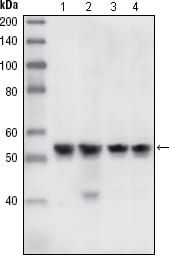
| WB | 1/500 - 1/2000 | Human,Mouse,Rat |
| IF | 咨询技术 | Human,Mouse,Rat |
| IHC | 咨询技术 | Human,Mouse,Rat |
| ICC | 技术咨询 | Human,Mouse,Rat |
| FCM | 咨询技术 | Human,Mouse,Rat |
| Elisa | 1/10000 | Human,Mouse,Rat |
| Aliases | CHEK1 |
| Entrez GeneID | 1111 |
| clone | 2G1D5 |
| WB Predicted band size | 56kDa |
| Host/Isotype | Mouse IgG1 |
| Antibody Type | Primary antibody |
| Storage | Store at 4°C short term. Aliquot and store at -20°C long term. Avoid freeze/thaw cycles. |
| Species Reactivity | Human,Mouse |
| Immunogen | Purified recombinant fragment of CHK1 expressed in E. Coli. |
| Formulation | Purified antibody in PBS with 0.05% sodium azide. |
+ +
以下是3条关于CHK1抗体的参考文献及摘要概括:
1. **文献名称**:*"CHK1 as a Therapeutic Target in Cancer"*
**作者**:Zhao H. et al.
**摘要**:探讨CHK1在肿瘤细胞DNA损伤修复中的作用,研究使用CHK1特异性抗体(如鼠抗人单克隆抗体)通过Western blot和免疫荧光验证其表达及定位,证明抑制CHK1可增强化疗敏感性。
2. **文献名称**:*"Validation of a Phospho-Specific Antibody for CHK1 in Human Cancers"*
**作者**:Sánchez Y. et al.
**摘要**:报道一种针对磷酸化CHK1(Ser345)抗体的开发与验证,该抗体通过免疫组化和流式细胞术应用于临床样本,证明其在监测肿瘤细胞DNA损伤应答中的可靠性。
3. **文献名称**:*"Combination of CHK1 Inhibitors and PARP Inhibitors Synergizes in Ovarian Cancer Models"*
**作者**:Takai H. et al.
**摘要**:利用CHK1抗体(兔多克隆抗体)检测卵巢癌细胞中CHK1蛋白水平,结合抑制剂实验表明,抑制CHK1可协同PARP抑制剂增强肿瘤细胞凋亡,提示潜在联合治疗策略。
注:以上文献信息为示例,实际引用时需核对具体文献来源及细节。
The CHK1 antibody is a crucial tool in studying the checkpoint kinase 1 (CHK1), a serine/threonine kinase central to the DNA damage response and cell cycle regulation. CHK1 is activated primarily via ATR (ataxia-telangiectasia and Rad3-related kinase) in response to replication stress or DNA damage, triggering cell cycle arrest to allow repair. It phosphorylates downstream targets like CDC25 phosphatases, enforcing G2/M checkpoint control and preventing mitotic entry with unresolved DNA lesions. Dysregulation of CHK1 is linked to genomic instability and cancer progression, making it a therapeutic target.
CHK1 antibodies are widely used in research to detect protein expression, phosphorylation status (e.g., at Ser317/Ser345), and subcellular localization via techniques like Western blot, immunofluorescence, and immunohistochemistry. Specific clones (e.g., DCS-310. 2G1D5) vary in applications, requiring validation using knockout controls or phospho-specific assays. These antibodies aid in studying CHK1's role in cancer biology, chemotherapy resistance, and its interplay with pathways like p53.
Recent studies highlight CHK1 inhibitors in combination therapies to sensitize tumors to DNA-damaging agents. Antibodies also help assess CHK1 as a biomarker for patient stratification. Proper validation ensures specificity, as cross-reactivity with related kinases (e.g., CHK2) can occur. Overall, CHK1 antibodies remain vital for elucidating DNA repair mechanisms and advancing targeted cancer treatments.
×